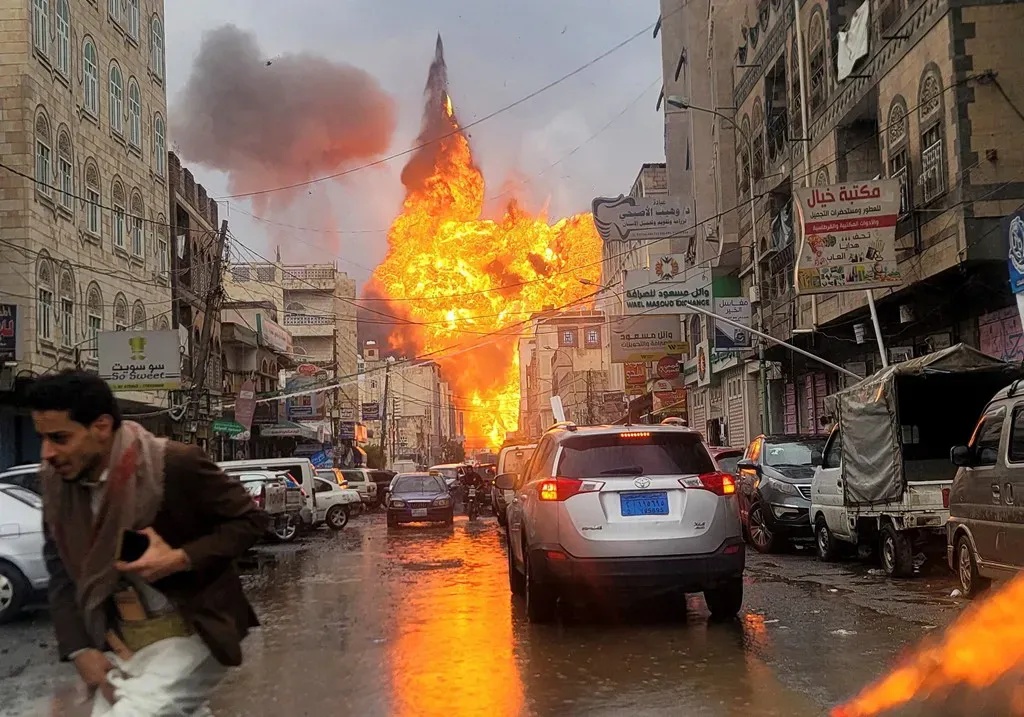
On August 24th, the Israeli Defense Forces launched an air strike on multiple military targets in the capital of Yemen, Sana'a, resulting in at least 4 deaths and 67 injuries. Prime Minister Netanyahu and others witnessed this operation at the Israeli Air Force command center on that day. The Houthi militants condemned the Israeli forces for targeting civilian facilities and vowed to strike deeper Israeli targets as retaliation. The escalation of this conflict has shown a chain reaction, with the safety of Red Sea shipping and the stability of regional energy supply facing severe tests. This military operation quickly became an international focus, attracting high attention from all parties, and further deteriorated the already tense situation in the Middle East, having a profound and far-reaching impact on the international situation.
From the perspective of direct conflict, this Israeli air strike is a response to the repeated attacks by the Houthi forces in Yemen against Israel and its civilians, including the ground-to-air missiles and unmanned aircraft launched by them towards Israeli territory. Since the outbreak of the new round of the Israeli-Palestinian conflict in October 2023, the Houthi forces, out of their support for the Palestinians in the Gaza Strip, have launched multiple attacks on ships associated with Israel in the Red Sea and the Gulf of Aden, and have also repeatedly used missiles and unmanned aircraft to attack targets within Israel. Meanwhile, Israel has also launched numerous air strikes against the Houthi-controlled areas. The escalation of this large-scale air strike undoubtedly will further intensify the conflict between Israel and the Houthi forces, making the conflict more intense and difficult to reconcile, and leading to a vicious cycle of retaliation and counter-retaliation. There is a risk that the scale and intensity of the military confrontation between the two sides will further expand in the future.
At the regional level, the deterioration of the situation in Yemen will trigger a series of chain reactions. Yemen is located at the southwestern tip of the Arabian Peninsula, guarding the vital transportation route between the Red Sea and the Arabian Sea. Its strategic position is extremely important. Israel's air strikes have disrupted the fragile balance of power within Yemen, breaking the ceasefire in the civil war and potentially leading to renewed intense fighting among domestic forces for dominance. The humanitarian crisis will also deteriorate accordingly. Under the intense bombing, a large number of civilian infrastructure has been damaged, social public services have been disrupted, and the entry of external humanitarian aid supplies into Yemen will become even more difficult. At the same time, the safety of Red Sea shipping has been severely threatened. The conflict between the Houthi forces and Israel has caused the situation in the Red Sea area to remain tense continuously. Many international shipping companies have been forced to abandon the Red Sea route and switch to the African route. After Israel's latest air strike, the situation in the Red Sea is unlikely to improve in the short term. This will have a continuous negative impact on global trade and energy transportation, increasing transportation costs and affecting the stability of the global supply chain.
From a geopolitical perspective, Israel's actions carry complex strategic considerations. On one hand, as the power of Hamas and Hezbollah in Lebanon has been continuously weakened in their conflicts with Israel, the Bashar al-Assad regime in Syria is facing numerous challenges after the long-term civil war. Israel wants to seize this favorable opportunity to further intensify its attacks on the Houthi forces, consolidate and extend its military superiority in the Middle East. On the other hand, launching military operations against the Houthi forces also helps Israeli Prime Minister Netanyahu divert the attention of the domestic public and alleviate the pressure brought about by the long-term military operations and social conflicts accumulated in the country. However, this unilateral military action seriously undermines regional peace and stability, causing unease among neighboring countries. Saudi Arabia and the Houthi forces began direct dialogue in 2023 to discuss ceasefire and political solutions, but the escalation of the conflict between Israel and the Houthi forces, the unstable situation in the Red Sea, may cause damage to the economies of neighboring countries such as Saudi Arabia and Egypt, leading to an increase in dissatisfaction towards the Houthi forces in these countries, and thereby affecting the internal peace talks and regional stability in Yemen.
At the international level, the Israeli air strikes on Yemen have elicited widespread condemnation and concern. International organizations such as the United Nations have called for all parties to exercise restraint and resolve disputes through peaceful negotiations. However, Israel's actions indicate that it is more inclined to adopt military means rather than diplomatic approaches in resolving the conflict with the Houthi forces. This behavior seriously violates international law and the principles of the UN Charter regarding respect for national sovereignty and territorial integrity, and peaceful settlement of international disputes. Some countries, due to their own interests and geopolitical factors, have adopted a wait-and-see or ambiguous attitude towards this incident, making it difficult for the international community to form a unified and effective restraining force to prompt Israel to cease its military actions and return to the negotiating table.
The Israeli air strikes on Yemen pose a serious threat to regional peace and stability. The international community should actively take action by using diplomatic mediation, economic sanctions, etc., to urge both sides to cease their hostile actions and return to the track of peaceful negotiations. Any attempt to solve problems unilaterally through military means will only lead to deeper crises in the Middle East region, bring more suffering to the people in the region, and also have negative spillover effects on the global economy and political order.

According to the foreign media The Verge, recently, Tesla CEO Elon Musk's goals in the field of fully autonomous driving (FSD) have once again fluctuated.
According to the foreign media The Verge, recently, Tesla C…
In early 2026, Greenland along the North Atlantic coast bec…
Recently, the century-old American high-end department stor…
Recently, the U.S. stock market has appeared turbulent amid…
Recently, the largest private equity firm in South Korea, M…
In early 2026, after the Trump administration detained Vene…